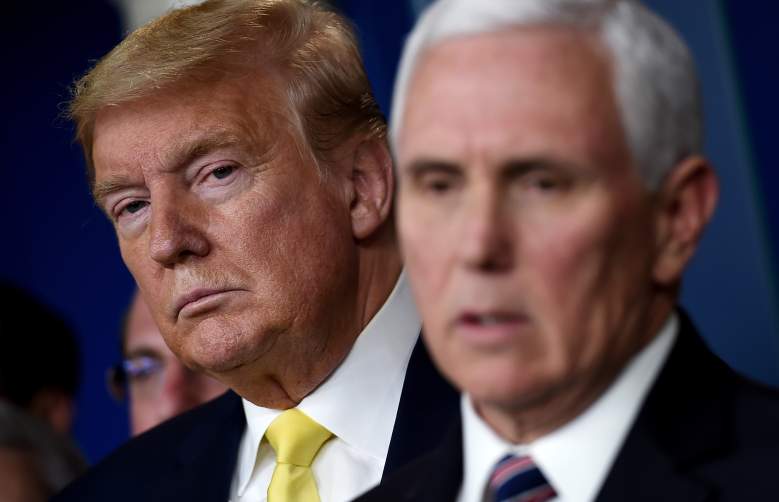
Getty US President Donald Trump listens as Vice President Mike Pence speaks about the COVID-19 (coronavirus) alongside members of the Coronavirus Task Force in the Brady Press Briefing Room at the White House in Washington, DC, March 9, 2020.
There seems to be some confusion, even from President Donald Trump, over Vice President Mike Pence’s powers in the electoral college certification at the joint session of Congress today. Many people are asking whether Pence can reject fraudulently chosen electors and whether he can change the election.
The vice president’s powers are limited. He is there to preside over the session, not to actively participate. His role in the certification process is detailed in the Electoral Count Act of 1887. Watch a live stream of the meeting here.
Here’s what you need to know:
The Vice President’s Powers Are Limited By the Electoral Count Act of 1887, Enacted After an Intervention in the Electoral Votes in James Buchanan’s Election
Pence, as vice president and president of the senate, is granted some limited powers during the meeting of Congress to certify electoral votes. But those powers stop short of overturning the election or rejecting fraudulently chosen electors.
The Electoral Count Act of 1887 was enacted because of a previous Senate president intervening in the electoral count. After James Buchanan’s win in 1857, the Senate president overruled an objection against Wisconsin electors because their certification process had been delayed due to a a snowstorm in 1856, according to The Washington Post.
“One of the points of the Electoral Count Act is to constrain the vice president given this earlier episode and make it clear that he’s a presider, not a decider,” said former Federal Election Commission Chairman Trevor Potter and president of the Campaign Legal Center in an interview with NBC News.
The act says the President of the Senate – Pence – is to preside over the meeting. His role is to open certified electoral votes and give them to appointed tellers in alphabetical order by state. The tellers read the votes and make a list of them, then present them back to Pence. Pence calls for any objections, and, if any are made, the House and Senate meet separately to discuss the objection. Once they come to a decision, Pence announces that decision.
An Objection Can Only Be Sustained With a Majority Vote From Both Chambers of Congress
A member of Congress can make an objection for any reason, but their objection must be submitted in writing and signed by both a member of the House and a member of the Senate. The House and Senate then enter meetings to discuss the objection. Both chambers must agree to the objection by a majority vote for the objection to be sustained. Otherwise, the original electoral vote stands, the Electoral Count Act of 1887 says.
Among those expected to submit objections are Rep. John Joyce, R-Altoona.
“Today I signed the official objection to the Pennsylvania electors ahead of tomorrow’s Electoral College certification vote,” he wrote on Twitter. “We must fight for free and fair elections – and the rule of law.”
Potter was co-author of an opinion piece published in the New York Times, “The Electoral College Isn’t Supposed to Work This Way.” He and Professor Charles Fried of Harvard Law School, who served as President Ronald Reagan’s solicitor general, wrote about expected objections to Biden electoral votes in key states.
“This, in theory, could result in a deadlock that could be broken by the House voting — with one vote for each state delegation — for president, resulting in the election of Donald Trump to a second term after losing in both the popular vote and the Electoral College. The fact that Democrats hold a majority in the House makes this outcome unlikely, of course, but it is a viable gambit for future elections,” the article said.
READ NEXT: Electoral College Certification Live Stream: Watch the Joint Session of Congress Online

